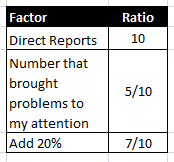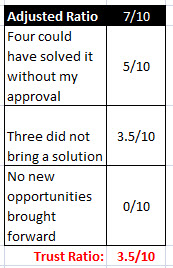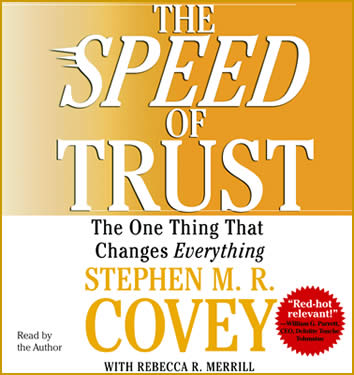If you are a manager, do your people trust you? Would you like to know if you are the problem in your organization?
Here is a Simple Test:
1. How many of your people bring you problems? Think back over the last week or two and give yourself a ratio. For example:

- If you have 10 employees and only 2 have brought you problems, give yourself a 2/10.
- If you have 10 employees and 9 have brought you problems, give yourself a 9/10.
- Now add 20% to your ratio. Not everyone has problems all the time. The goal, however, should be to allow a free flow of information when problems arise.
Feel free to classify challenges, obstacles, and other difficulties as problems.
More problems would seem to be more an indication of bad management, but this is an illusion.
Openness about difficulties reveal trust. It is counter-intuitive, but the lower your ratio, the more of an issue you may have with trust in your office.
2. Adjust your ratio for inflation:

- For every problem that your people brought to you that they could have solved on their own (at their level of competence), adjust your ratio down by .5 per person. The odds are that they are covering their butts by getting your approval. This is time-wasting political behavior. Such activities evaporate in a climate of trust.
- For every problem that your people brought you where they did not also bring you a solution, adjust your ratio down by .5 (if they trust you, they will generate solutions because they know you will listen).
- For every new opportunity that your people brought you, adjust your ratio up by .5 (since they will be more likely to be proactive in an environment of trust).
How is Your Ratio?
Where trust is lacking, employees wait for managers to tell them what to do. After all, they don’t want to get in trouble for doing the wrong thing. They avoid bringing bad news to the boss even when that bad news is exactly what the boss needs to hear. They rarely volunteer to take on additional assignments.

In an environment of trust, your people will bring you problems. But, as you cultivate trust, they will also bring you solutions.
The Professor’s Recommended Reading:
So, what is the trust ratio in your office?
If you are a manager, how are you doing? Do your employees trust you, or is it possible that you have a trust deficit?
If you are an employee, how is your manager doing?
I would love to hear what you think about the trust test.
Darin Gerdes, Ph.D.
_______________
Dr. Gerdes is the Director of the MBA Program at Charleston Southern University. All ideas expressed on www.daringerdes.com are his own.


